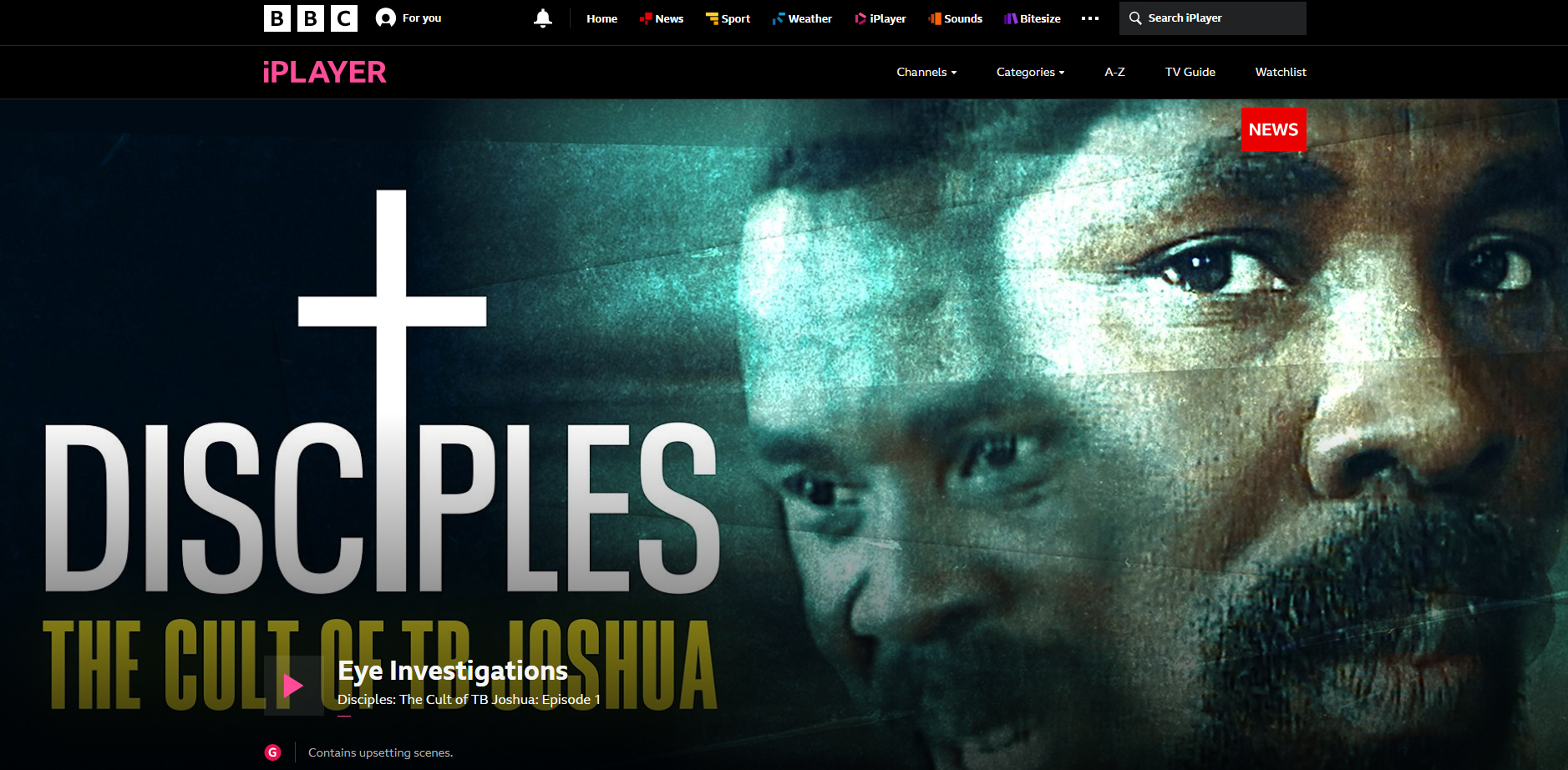 BBC publicity of the 'Eye Investigations' programme . [source: BBC website]
BBC publicity of the 'Eye Investigations' programme . [source: BBC website]
[This is an excerpt from an article in The Round Table: The Commonwealth Journal of International Affairs. Views expressed do not reflect the position of the editorial board.]
The British Broadcasting Corporation (BBC)’s ‘Disciples: The Cult of TB Joshua’ documentary series, which aired in January of this year, exposed accusations against the late Prophet TB Joshua that included torture, rape, and other improprieties. These BBC documentaries included female members of his closest circle who claimed to have been raped and mistreated repeatedly over an extended period of time. Although these allegations sparked intense debates regarding the late prophet’s life and legacies, more importantly, the underlying issue speaks to broader contention about regulation and supervision of the activities of religious bodies in Nigeria. Curiously, there have been prior allegations of misdemeanour made by some of the actors in the documentaries about the late prophet, but they did not gain global attention or merit a state inquest into the matter. According to some African religious scholars, states in Africa, especially Nigeria, may have found it challenging to prosecute a powerful, charismatic Pentecostal leader who possessed the stature of a late prophet due to his unusual command and extensive spiritual, political, and economic influence. Most significantly, though, a sizeable portion of the public and the accused’s immediate flock generally react indifferently, if not defensively, to accusations of rape or other improprieties against men of God.
It is appropriate to mention that the late TB Joshua and his ministry were unusually marred by a great deal of controversies, against the backdrop of modern charismatic Pentecostal preachers in Nigeria. For example, a public dispute concerning his true identity was sparked by his claim that he was born-again while still in his mother’s womb, the enigmatic circumstances surrounding his birth, and the absence of any Christian mentorship. Furthermore, he was accused of fabricating his healing and deliverance miracles, despite their widespread popularity and followership. Consequently, a number of Christian leaders, including the Pentecostal Fellowship of Nigeria (PFN) and the Christian Association of Nigeria (CAN), generally shunned him. Also, in 2012, it was reported that the government of Cameroon issued a strong warning to its citizens not to visit Joshua’s Synagogue Church of All Nations (SCOAN) any more. In the communiqué, Minister of Foreign Affairs Henri Eyebe Ayissi explained that some Cameroonians had had terrible experiences during their visit.
Research Article – Soft power prophet(s): The unexplored dimension of Nigeria’s religious soft power potential
Opinion – Anatomy of Nigeria’s electoral process: a missing rib
Special edition of the Round Table Journal on religion
Likewise, a guesthouse for foreign visitors to the church collapsed in 2014 as a result of an attempt to add two more stories without obtaining proper approvals or modifying the building’s base to make it sturdy enough to support the additions. Eighty-four South Africans were among the 116 persons who were reportedly killed in the tragedy. The incident was described as ‘one of the worst tragedies in South Africa’s recent history’ by Jacob Zuma, who was the president of the nation at the time. In an attempt to show his sympathy to the victims’ families, Joshua said during a church service that he would begin visiting South Africa to perform services at least once a month. However, the ruling African National Congress (ANC) youth wing, enraged by suspicions, warned the late Prophet against visiting the country. Meanwhile, the prophet refused to appear before the Lagos state government’s appointed Coroner to testify about what caused the accident; instead, he challenged the Coroner’s jurisdiction in a Federal High Court, allowing Joshua to escape testifying before the coroner. He adamantly maintained his position that there was sabotage directed at him and claimed that an airplane had circled the structure prior to its final collapse. No explanation was provided to support his bogus claim that he was the primary target of the aforementioned aircraft or to identify the individuals responsible for that action.
Notwithstanding these controversies, the late prophet established a successful ministry whose influence and impact are indisputable; as was widely reported, Presidents of nations, kings, celebrities and other prominent personalities sought his guidance and counsel. Without a doubt, state policies in some African states were made favourable to the late prophet, thanks to the mediatory role he played in political issues.
The broad concerns that can be drawn from these BBC documentaries about the late T.B. Joshua and his ministry are that gender-based violence, human rights violations, and acts of gross misconduct connected to religious organisations are not just beginning to come to light but are also having consequences.
Patrick Afamefune Ikem is an Independent Researcher, Port Harcourt, Nigeria and Confidence Nwachinemere Ogbonna is a Lecturer, Department of Political Science, Evangel University, Akaeze, Nigeria.



